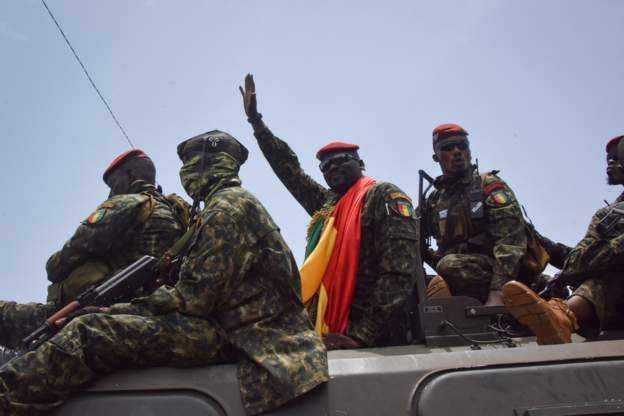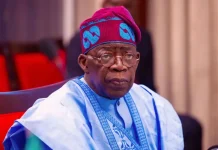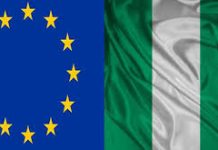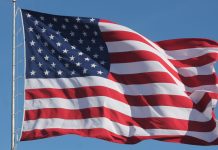West African leaders met Guinean coup leader Colonel Mamady Doumbouya in the capital Conakry on Friday, where they pushed for elections within six months, but apparently failed to receive firm commitments.
The meeting between Ghanaian President Nana Akufo-Addo, Ivorian President Alassane Ouattara and Doumbouya came after a regional summit on Thursday, which urged swift elections and sanctioned Guinea’s putschists.
On September 5, special forces led by Doumbouya assaulted the presidential palace and ousted president Alpha Conde, sparking international condemnation.
After earlier suspending Guinea over the coup, the Economic Community of West African States (ECOWAS) on Thursday called on the junta to hold presidential and parliamentary elections within six months.
The 15-nation bloc also imposed a travel ban on junta members and froze their financial assets.
The Ghanaian and Ivorian presidents travelled to Conakry the next day where they met Guinea’s strongman in the city’s Sheraton hotel.
But the results of their meeting appeared inconclusive.
Akufo-Addo, whose country holds the rotating presidency of the organization, spoke of “a frank discussion with the head of the junta” at the airport before his departure.
Asked by reporters earlier whether Doumbouya had accepted the proposed six-month transition period, Akufo-Addo responded: “We are talking.”
Ghana’s president added that Doumbouya is awaiting the conclusions of his own internal consultation on restoring civilian rule.
Ouattara, for his part, simply said the talks had gone “very well”.
“We met President Alpha Conde, he is well,” added Akufo-Addo.
“We leave with the hope that the new Guinean authorities have understood that it is necessary to act quickly and well. We are sticking to the release of Mr Conde,” he said.
The putsch has fuelled international concerns over democratic backsliding across west Africa and drawn parallels with Mali, which suffered two coups since August last year.
– Sanctions –
Doumbouya began a four-day series of talks on Tuesday designed to sound out the country’s political and civil society leaders on the path towards the civilian rule.
But he has so far refused to commit to a timetable.
READ ALSO: Taliban Shuts Down Women Affairs Ministry In Afghanistan
“The only timetable that counts is that of the Guinean people who have suffered so much,” the former French legionnaire told political leaders in a closed-door meeting on Tuesday.
When faced with a similar coup in neighbouring Mali last year, ECOWAS imposed economic sanctions but lifted them after the military committed to restoring civilian rule within an agreed timeframe.
However, more than a year since the putsch in Mali, the army is still in power. There are also increasing doubts about a pledge to hold elections in February next year.
On Thursday, after the regional summit focused on Guinea, ECOWAS Commission President Jean Claude Kassi Brou insisted that the country’s transition must be “very short”.
Junta sanctions are designed to send a “strong signal to all those who are tempted to have this type of idea,” he added
– Captive Conde –
Public discontent in Guinea had been brewing for months before the coup over the leadership of Conde, 83.
A former opposition figure, Conde became Guinea’s first democratically elected president in 2010 and was re-elected in 2015.
But last year, he pushed through a controversial new constitution that allowed him to run for a third term in October 2020.
The move sparked mass demonstrations in which dozens of protesters were killed. Conde won the election but the political opposition maintained the poll was a sham.
The military is holding the former president, despite international calls for his release.
Akufo-Addo said on Thursday that he and Ouattara had been permitted to visit Conde that day.
Guinea’s junta has agreed to the principle of freeing the deposed president, but the issue remains sensitive.
Opposition groups are also opposed to releasing him, for example, citing the danger he might try to regain power.
A poor nation of 13 million people, Guinea has abundant deposits of iron, gold, diamonds and bauxite, the ore used to make aluminium. Mining is the driver of the economy.
AFP













